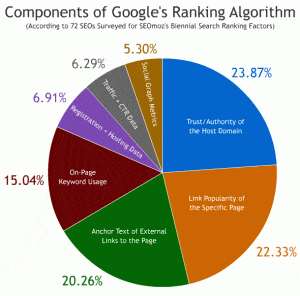Is Copywriting The Heart of SEO?
Writing SEO copy, or indeed any piece of copy for any medium, is a mixture of art, application and science.
The myth is that Ad Agency copywriters get stoned or bevved up all day and wait for a moment of genius to come unbidden as the gentle muse settles upon their throbbing heads to come up with “go to work on an egg” or something equally inspired! Rubbish of course! It’s hard graft involving research, demographic considerations, endless subbing and drafts, brand considerations etc. I know. I’ve been there and got the “100 Yard Copywriter’s stare”.
It Starts with Search
SEO copywriting still demands all those factors above, but is overlaid with dozens of other considerations that are a bit like playing one of those picture tile puzzle thingies! SEO copywriting is a different animal partly because it requires the injection of seemingly random phrases in a context that remains semantically relevant in both on and off-site copy. It’s different because the ultimate objective of anything you write is to attract traffic (i.e. people) to the site - a far more immediate call to action than any other type of advertsing or marketing copy can ever achieve.
The journey starts off with search, which is the most common online activity after email, no matter how old the user. Search traffic is clearly important (as long as it’s targeted search traffic) and copy, in terms of its quality and relevance as well as how well it’s optimised, on and off site is key to attracting those highly focused visitors. According to Rand Fishkin at SEOmoz, the pie chart below indicates the factors that influence Google in deciding whether your site best matches any particular search terms and criteria.

Google Thinks Copy Off-Site Is More Imporant Than Copy On-Site!
Although I might take issue with the weight assigned to on page keyword density, the clear message is that what happens off your site almost matters more than what is on it. When pushed, some SEOs will even maintain the only on-site text that really matters is page titles. That’s why off-site link building using articles or blogging is so crucial to white hat SEO.
Whatever the emphasis may be, like most purposeful commercial writing, SEO copywriters should always try to get into the head of the audience. Put themselves in the shoes of those readers they are writing for. In the words of my fellow countryman and native bard Robert Burns:
“O wad some Pow'r the giftie gie us To see oursels as others see us. It wad frae money a blunder free us, And foolish notion.”
It’s also true that what others say about you carries more weight than anything you say yourself. Google wants to know that people are linking to you (talking about you) and the words they’re using (anchor text) to do that because it’s a good relevance indicator. So always put the emphasis on quality and produce the best content you can, but even good content won’t rank well if you don’t make clear what it’s supposed to rank for.
Write For Your Audience - Not The Spider!
I’ve always been a believer in the fact that it’s people, not Search Engines, that buy whatever stuff it is you sell on your site. Content (on and off-site) should be aimed primarily at those human visitors. The advantage of having such a reader focused online strategy based on copy that visitors find useful, informative and valuable is that not only do your visitors and customers like you, Google positively loves you too!